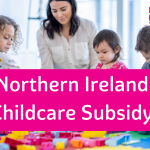All Party Group on Early Learning and Childcare focuses on the quality of early learning and childcare in Northern Ireland
The All Party Group on Early Education and Childcare, chaired by Nicola Brogan MLA, held its first meeting of 2024 at Parliament Buildings, Stormont on Thursday 1 February. This meeting brought together around 50 attendees including elected representatives, senior departmental officials and a wide range of stakeholders representing early education and childcare, the women’s sector, business, parents’ organisations and more.
Taking place in the week that a deal was agreed that will see a Northern Ireland Executive returned to Stormont, there was a strong sense of optimism from those attending the meeting that meaningful progress on the long-awaited new Early Learning and Childcare Strategy will now become a reality.
The Chair provided an update on action points from the last meeting:
- The APG has written to the Permanent Secretary at the Department of Finance to request an update on correspondence with HMRC in relation to the Tax-Free Childcare scheme, the call for the removal of the cap and extension of support for families.
- The APG has written to the Secretary of State requesting a meeting to discuss the current challenges facing families and the early learning and childcare sector, and the need for interim support in the absence of an Early Learning and Childcare Strategy.
- The APG has been in correspondence with Sorcha Eastwood, Chair of the All Party Working Group on Skills, to organise a joint meeting with the All Party Group on Early Learning and Childcare.
Update from Department of Education: Progress on new Early Learning and Childcare Strategy
Tina Dempster, Head of the Childcare Strategy Team within the Department of Education, was unable to attend the meeting but provided a progress update on the new Early Learning and Childcare Strategy. The Department of Education is committed to bringing forward proposals for the Executive Early Learning and Childcare Strategy as quickly as possible to an incoming Minister and Executive. Work is ongoing, including further detailed engagement with counterparts in other jurisdictions and with wider stakeholders.
The Department has also recently engaged the services of the Strategic Investment Board to review the costing methodology and assist with the assessment and refinement of options. The recommendations of the recently published Independent Review of Education report relating to early years provision are also currently being considered in the context of the new Strategy.
Update from Department of Health: Review of Minimum Standards planned for April 2024
Similarly, Marc Bailie, Head of the Family Policy Unit within the Department of Health, was unable to attend in person. Marc shared an update confirming that he will use the next meeting of the All Party Group in April to provide a full overview of the plan for the Review of the Minimum Standards and start the engagement as part of the review. This will be run as a workshop style session and stakeholders will be invited to come prepared to participate and share their views.
Professionalisation within group childcare settings
Moving on to the main business of the meeting, the Chair introduced Audrey Rainey and Mark Feeney from Early Years – the organisation for young children and Sheelagh Carville, from Stranmillis University College. They presented on professionalisation within group settings and work to scope the establishment of a professional body for the early years workforce in Northern Ireland.
Working jointly, Early Years and Stranmillis have undertaken extensive research and organised a joint conference on professionalism in the summer of 2023. This identified a range of benefits a professional body could bring for the workforce including a focus on recognition, respect and quality. It would offer a collective voice for individuals and organisations to promote the interests of those working in the sector and support the provision of quality early learning and childcare services. At present, there is a strong sense that the sector and its workforce remain undervalued and misunderstood. There is a lack of parity with statutory provision and the formal education system, rather than an equal partnership. International comparisons were drawn with Sweden, New Zealand and Ireland where work is underway to advance professionalism in early learning and childcare.
The presentation shared the findings of research with providers and the workforce. Key findings included strong support for the establishment of a professional body to:
- provide a strong collective voice on workforce and quality issues
- promote working in early education and childcare
- share information to support educators across the sector
- provide continuing professional development opportunities
- maintain a register of employer driven qualifications for those working in the sector
- adapt a code of ethics and professional responsibilities
- engage in and collate research on the early learning and childcare profession.
Research also highlighted current qualification levels across the sector and a call for investment to support group settings in achieving degree led provision and ensuring staff can access professional development opportunities. A key point raised was the need for further investment to support providers in offering quality, appropriate provision for children with special educational needs.
The presentation closed with a recommendation that the new Early Learning and Childcare Strategy gives consideration to developing a new early years professional body, informed by wider consultation with other sectoral bodies and stakeholders to further scope representation.
Questions and discussion reflected strong support for a focus on professionalism and a body to promote the interests of those working in the sector and the provision of quality early learning and childcare. At the same time, there was recognition for the breadth of work already underway through existing services, such as the Childcare Partnerships, reflecting the importance of not duplicating what is already there but working strategically and in partnership. Finally, the group discussed the importance of pay, terms and conditions reflecting the value of those working in the sector. This is critically important both to attracting people to choose early learning and childcare as a career, and to retaining qualified, professional and experienced staff within the sector.
The full presentation is available to download from the top tight of this page.
High quality childcare in practice
The meeting then heard from Francis Loye and Sarah Shields from Giggles Early Years (based outside Newry) who presented on redefining early childhood education – quality in practice. Giggles is a graduate led setting providing early learning and childcare for over 330 registered children. Operating in an area of disadvantage, they have become an integral part of their community. Established with a strong vision to provide quality early childhood education, Giggles employs a dedicated Pedagogical Lead and maintains a child centred approach nurturing learning through play and promoting positive relationships and environments.
The presentation highlighted the ‘invisible benefits’ of high quality early education and childcare provision in the community, from improved childhood outcomes and the early identification of need, to family support and working with at risk families. The staff at Giggles work in partnership with parents, building strong bonds, creating a sense of community and signposting to further support that may be required.
Recognising the link between the impact of quality early education on children, and the experience and qualifications of practitioners, Giggles invest in developing and supporting their staff. However, this is in the context of a wider challenge for the sector in terms of workforce recruitment and retention. Due to many years of underinvestment, the childcare workforce is underpaid and undervalued, with experienced practitioners having to leave for other sectors offering higher pay with less responsibility and providers struggling to recruit properly qualified staff. The biggest driver of high quality provision is high quality staff, so this is a huge challenge for the sector. In the absence of government investment, providers’ costs must be met solely through fees from parents. Increasing pay for the workforce therefore results in increased costs for families, who are already struggling to afford the childcare they need. This is an immediate and pressing issue with an increase in the National Minimum and Living Wage in April set to push up staff costs for providers and, in turn, lead to rising fees for parents.
Francis shared powerful evidence of how workforce recruitment and retention challenges have affected his setting, charting a significant increase in the number of staff who have left in recent years, moving to higher paid, less demanding roles. Staff turnover in 2022 saw a combined 70 years of experience lost from the sector, and 28 years in 2023. Case studies brought these figures to life, highlighting the specialist skills and qualifications of staff who have moved on. As well as moving into other sectors, such as retail, staff are moving into the statutory sector or are taking up roles in ROI where there is better pay and recognition of the value of their role. Combined with the loss of key staff, settings are struggling to recruit new staff into the sector. Issues include extensive vetting procedures – above and beyond those required to work in statutory and education settings – and delays in required health checks being completed, a decrease in students studying for childcare qualifications, and childcare student placements typically being in schools rather than daycare settings.
The presentation closed with a call for transformational change to value quality early learning and childcare. Staff need to be paid fairly without adding to the financial burden for families. This requires ambitious funding for settings enabling them to improve pay and conditions, and attract and retain a well-qualified workforce.
The full presentation is available to download from the top tight of this page.
Discussion: Importance of investing in quality early learning and childcare
Questions and discussion reflected the importance of properly funding early education and childcare, and ensuring it is not seen as something that can be done ‘on the cheap’. Several stakeholders pointed to concerns about rising costs from April and what this will mean for the sector and for families.
MLAs from across the political parties reiterated their support for investment in early learning and childcare as a day one priority for the new Northern Ireland Executive. They acknowledge the critical role of the All Party Group on Early Education and Childcare in sharing evidence, best practice and keeping this issue at the top of the agenda.
Thanks to speakers, members and stakeholders for their engagement
Commenting on the meeting, Chair Nicola Brogan MLA thanked the speakers, the members, and all those who attended:
“Thank you to everyone who attended and participated in today’s All Party Group. For all of us working in this sector, we are well aware of the high quality early education and childcare that is provided across a range of settings, and of the professionalism and dedication of the staff that work so hard to provide this. As well as supporting parents to work, they are transforming children’s lives, nurturing their development and providing early identification of need.
Support for the early learning and childcare sector, to allow for appropriate investment in its workforce, must be a key component of the new Early Learning and Childcare Strategy – which has to be a day one priority for our returning Executive. I look forward to working constructively with Ministers, other MLAs and those across the sector to deliver this progress.
I would like to thank everyone for their continued support for this All Party Group, which in the absence of an Executive over the past two years, has provided an important forum for sharing knowledge and best practice.”
Looking ahead
The Chair closed the meeting by thanking all stakeholders for their continued high level of engagement with the All Party Group and advised that the next meeting will be held in April, focusing on the Review of the Minimum Standards.
The Chair will also write to the new Education Minister issuing an invitation to attend and present to the All Party Group at their earliest convenience.
Find out more about the All Party Group on Early Education and Childcare
Further information on the All Party Group on Early Education and Childcare, including links to read more about previous meetings, is available here.
Employers For Childcare provides the Secretariat for the All Party Group on Early Education and Childcare – correspondence to strategy@employersforchildcare.org.






